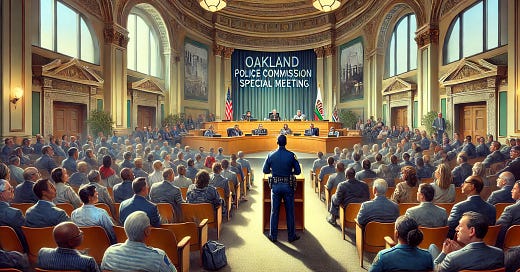Oakland Police Commission punts on the pursuit policy—Chief Mitchell takes charge
At the latest Police Commission meeting, Chief Mitchell states he will revise the pursuit policy. He notes that officers "fear doing their job" due to the threat of discipline by the commission.
The Oakland Police Commission (OPC) held a special meeting on Friday, January 10, to reopen discussions about the pursuit policy under pressure from the city council and the governor. Members of the Oakland Police Department (OPD), including Chief of Police Floyd Mitchell, were asked to present to the commission.
OPC Chair Ricardo Garcia-Acosta opened the meeting by acknowledging the unusually large audience in attendance, driven by the public spotlight on the commission’s stance on the police pursuit policy. In his prepared statement, Garcia-Acosta emphasized that modifying the pursuit policy was outside the commission’s jurisdiction since it does not address specific tasks under the Negotiated Settlement Agreement (NSA) or use-of-force policies—the two areas of police operations where the OPC holds final approval authority.
Despite this assertion, Garcia-Acosta and other commissioners proceeded to question OPD representatives about the current policy “line by line.”
Chief Mitchell, who was hired by former mayor Sheng Thao from Lubbock Texas and began his tenure in May 2024, stated in his remarks that he has the authority to revise the policy after review by the City Attorney, the federal monitor, and NSA plaintiffs’ attorneys. Nevertheless, he welcomed input from the community and the commission and noted that they will follow the proper process, which may take time.
Mitchell emphasized that police morale and effectiveness has been degraded due the city’s politics and policies toward law enforcement. He noted, “the culture and conditioning of our police department is one of fear… they fear doing their job.” He added that OPD has a reputation as a place where any mistake could cost an officer their job—and their ability to secure employment in another department nationwide. He criticized the current disciplinary process, stating, “I have absolutely no problem with civilian oversight, but it has to be measured.”
Chair Garcia-Acosta responded, “I don’t want to confuse fear with accountability.” Members of the Coalition for Police Accountability applauded his comments. They rallied against police misconduct stemming from the Riders case two decades ago and advocated for the continuation of federal oversight indefinitely.
Chief Mitchell’s candid remarks, regardless of their sincerity, may put him at risk of future retribution from the commission. The commission has the power to investigate and discipline any officer, including the chief, and the power to terminate the chief—a power it exercised in the past in its wrongful termination of Anne Kirkpatrick in response to her criticisms of the commission. This authority effectively grants the OPC practical jurisdiction over any choice or action taken by the OPD.
Furthermore, the city council is considering legislation proposed by former councilmember Dan Kalb that would loosen the requirements to fire the chief, and would grant blanket authority to the Community Review Police Agency to conduct investigations of OPD without cause. Should these amendments pass, they may further exacerbate the “culture of fear” within OPD.
The City Council is scheduled to vote on these amendments on January 21.
Suspects fleeing police increases by 230% after pursuits are restricted
In his presentation to the commission, OPD Sergeant Urquiza-Lebin reported that the number of suspects fleeing police has increased significantly as police pursuits have declined. Since additional restrictions were implemented in 2022 (Special Order 9212, which limits pursuit speeds and adds another layer of supervisor approval), the number of suspects fleeing police stops (known as “failure to yield”) has risen over 200%, from 519 stops in 2022 (before the restriction) to 1,228 in 2024. Sergeant Urquiza-Lebin further noted that crimes such as burglary have surged over 300%, from about 500 incidents annually in 2017–2019 to roughly 1,800 in 2023. He emphasized that such an increase is not a normal year-to-year variation: “something has changed [criminal] behavior.”
The commission speculated on the root causes of these trends. Some questioned whether officers are refraining from pursuits for reasons unrelated to the policy. Commissioner Shawana Booker noted receiving numerous public complaints alleging that officers are “lazy” and wanted data on instances where police chose not to pursue suspects. Commissioner Samuel Dawit asked rhetorically whether officers are second-guessing their decisions due to the restrictions. Chair Garcia-Acosta and Vice-Chair Wilson Riles reiterated that pursuits are dangerous and defended their previous review of the policy, which recommended no changes.
Garcia-Acosta further criticized complaints about the policy, suggesting that they mostly originate from areas unaffected by pursuits—implying that crimes and pursuits are somehow localized only to specific regions of the city and that views from residents in other areas may lack legitimacy.
The commissioners also questioned OPD on alternatives to vehicle pursuits. Garcia-Acosta inquired about coordination with the California Highway Patrol and aerial support. Vice-Chair Riles reiterated his prior recommendations for the City Council’s Public Safety Committee to support OPD in adopting technologies such as fixed-wing drones and improved camera coordination with businesses without allowing pursuits.
What’s Next
Chief Mitchell will present proposed changes to the pursuit policy at a commission-sponsored Town Hall on Wednesday, January 15, at 6:30 PM at the East Bay Church of Religious Science, 4130 Telegraph Ave, Oakland.
Tags: Radar, Police Commission





